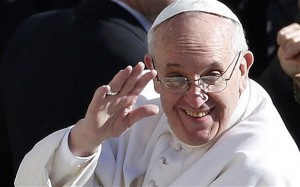The Weekly Francis is a compilation of the Holy Father’s writings, speeches, etc., which I also cross-post on Jimmy Akin’s blog.
This version of The Weekly Francis covers material released in the last week, from 13 April 2023 to 16 May 2023.
General Audiences
Messages
- 11 May 2023 – Message for the 109th World Day of Migrants and Refugees 2023
- 11 May 2023 – Message of the Holy Father to the participants in the International Conference ‘Peace among peoples. Sixty years after Pacem in Terris’
Regina Caeli
Speeches
- 13 April 2023 – To Members of the Religious Association of Social and Health Institutes (ARIS)
- 5 May 2023 – To the participants in the Pilgrimage of the diocese of Asti
- 10 May 2023 – To Participants in the Conference sponsored by the Pontifical Academy of Sciences
- 11 May 2023 – Private meeting of Pope Francis with His Holiness Tawadros II, Pope of Alexandria and Head of the Coptic Orthodox Church, on the occasion of the fiftieth anniversary of the historic meeting of their p
- 11 May 2023 – To the members of the Conference of Missionary Institutes in Italy
- 11 May 2023 – To the participants in the General Assembly of Caritas Internationalis
- 13 May 2023 – To the Participants in the general meeting of the Unión Mundial de las Organizaciones Femeninas Católicas (UMOFC)
- 13 May 2023 – Presentation of Credential Letters by the Ambassadors of Iceland, Bangladesh, Syria, The Gambia and Kazakhstan accredited to the Holy See
- 13 May 2023 – To the members of the ‘Asociación Agraria Jóvenes Agricultores’, Spain
Papal Tweets
- “In our daily mission as baptized Christians, may the love of Christ push us toward the peripheries of our societies to meet our brothers and sisters who have been cast aside and abandoned, to show them the Lord’s tenderness. #GeneralAudience” @Pontifex, 10 May 2023
- “I wholeheartedly thank His Holiness Tawadros II, Patriarch of the See of Saint Mark, for his commitment to the growing friendship between the Coptic Orthodox Church and the Catholic Church. May the blessed day quickly draw near when we will be one in Christ!” @Pontifex, 10 May 2023
- “Everyone must have the chance to live a dignified life in their native land. The choice to migrate or remain is a right that should be guaranteed for all. Let us work to ensure this is the case. #WDMR2023 @vaticanIHD C Message” @Pontifex, 11 May 2023
- “It is with great joy that I welcomed today His Holiness Tawadros II, Pope of Alexandria and Patriarch of the See of St. Mark, beloved brother and dear friend, with whom I celebrated the 50th anniversary of the historic meeting between Pope St. Paul VI and Pope Shenouda III.” @Pontifex, 11 May 2023
- “May the prayers of the Coptic martyrs, united with those of the Theotokos, continue to help our Churches grow in friendship, until the blessed day when we can celebrate at the same altar and receive together the Body and Blood of the Savior. oSUknZj Image” @Pontifex, 11 May 2023
- “#Birth rates and a welcoming attitude reveal how much happiness is present in society. A happy community naturally develops the desire to generate and welcome others, while an unhappy society is reduced to a group of individuals defending what they have at all costs.” @Pontifex, 12 May 2023
- “May #OurLadyOfFatima, the Mother of Jesus and our own mother, help us create paths of encounter and dialogue that lead toward peace, and grant us the courage to trod them without hesitation. #PrayTogether” @Pontifex, 13 May 2023
- “The Holy Spirit is demanding, because He is a true, faithful friend, who hides nothingand suggests what we need to change and where we need to grow. But when He corrects us, He never instills distrust. Rather, He assures us that we can always succeed with God. #GospelOfTheDay” @Pontifex, 14 May 2023
- “The #family is the main antidote to material and spiritual poverty, and to the problem of the demographic winter. Family-friendly social, economic and cultural policies need to be promoted in every country, as well as policies that welcome life.” @Pontifex, 15 May 2023
- “Building #peace means initiating and sustaining processes of development to eliminate poverty, to defeat hunger, to guarantee health and care, to safeguard the common home, to promote fundamental rights and to overcome discrimination determined by human mobility.” @Pontifex, 16 May 2023
Papal Instagram


